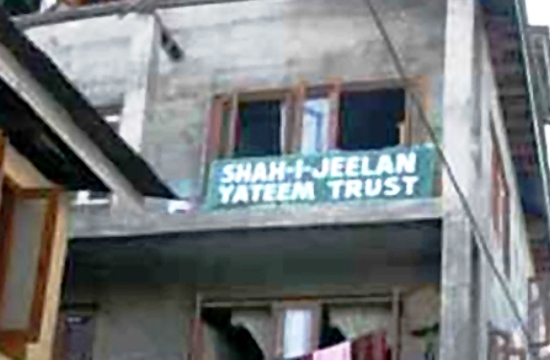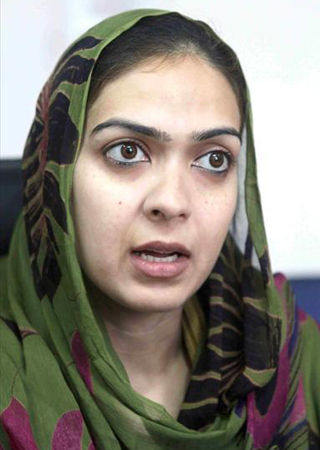A committed engineer-social activist does what all responsible citizens should. Qurat Masoodi, who believes in integrating orphans and disadvantaged children into the social milieu rather lock them up inside ill equipped orphanages, exposed the pathetic conditions in Shah-i-Jeelan. SYED ASMA reports how she shows the way.
 Recently an orphanage, Shah-i-Jeelan, in Dalgate was closed after the State Human Rights Commission took a strong notice of the conditions in there. The SHRC in their report highlighted sanitation of the place, accommodation for the children, their nutritional and the mental status.
Recently an orphanage, Shah-i-Jeelan, in Dalgate was closed after the State Human Rights Commission took a strong notice of the conditions in there. The SHRC in their report highlighted sanitation of the place, accommodation for the children, their nutritional and the mental status.
Shah-i-Jeelan was running smoothly like other numerous orphanages across Kashmir until a social activist, Qurat Masoodi, visited there, analysed the situation and complained about it and brought the whole affair to the notice of SHRC. She wanted to ensure that this “worthless place” should be immediately closed. Qurat also made it sure that the children in the orphanage should be rehabilitated afresh.
The children from this orphanage were sent to other orphanages and some back to their homes, as all of them were not orphans but belonged to Gujjar families of far-flung areas.
Qurat, a young social activist, an engineer by qualification aspires to work for the ‘children of conflict’. Her focus is mental health of orphans lodged the orphanages but she says her emphasis is also on child rights violation in Kashmir.
She started this, her own initiative a year ago called ‘Aash- the hope of Kashmir’ and says she is up against the concept of institutionalising orphanages.
“May be at some time we were in need of these institutions called orphanages but now rather than nurturing these children in a foreign environment, we should think of rehabilitating them in their own places, may be if not their own families but in their extended families,” says Qurat.
“We have no idea how badly these institutions [orphanages] have affected our society.”
She calles these institutions as ‘orphanage mafias’ but, mentions that there are some which are doing good and commendable work.
Qurat is working extensively to protect the rights of children, especially of orphans in Kashmir, which she feels have been exploited in one or the manner. This was one of the reasons that struck her in Shah-i-Jeelan orphanage in Dalgate and compelled her to file a complaint.
Qurat explains the place as tabail (stable). The condition and environment of the building was pathetic and unhygienic, she says.
The orphanage run by an former policeman, Abdul Rehman Mir of Lolab, was set up in a rented a building. He was paying Rs 9000 a month for three rooms in a three-storey building, besides two bathrooms, one for girls and other for the boy inmates.
Qurat had visited the place keeping a focus only the mental health status of the orphans but says the unhappy children in the orphanage asked for more care from her.
“I went there with my questionnaires, but after meeting them I felt I should help them in other ways if I can, so, I organsied painting and drawing competitions for them and held many interactive sessions”.
After participating in many interactive sessions these children gradually opened up and shared their problems with Qurat.
Many of the children there were suffering from severe infections and were not properly taken care of. “They [orphanage authorities] said children were taken to nearby government hospital but [they] failed to even produce their [medical] prescriptions when asked,” says Qurat.
While talking about Rehman and his behavior with the children in that orphanage, Qurat wears a look of disgust on her face.

She remembers few incidents which she feels are important to share to describe the ex-policeman’s character, “once I paid a surprise visit to the place and I heard cries, it was Sameer, one of the children in there.
On asking what was wrong with him, Rehman replied Sameer is into smoking and the manner Rehman punished him was noticeable. He used to ruthlessly beat them and used to stop feeding them”.
Another incident she remembers is when Rehman had kept many of the children locked up for not studying well. Qurat says his ultimate punishment was to stop giving them meals.
The questionnaire and interviews that Qurat carried along with her psychiatrist revealed that Rehman used to often beat them with his leather belt and many of them were tortured using staple pins.
She also shares that most of the children there suffered from malnutrition. “It is the case with most of the orphanages in Kashmir.”
“The diet sheet pasted on their walls is not actually what they feed them, most of the times it is chai, bread and rice twice a day, which is not enough for growing children.”
The children in Shah-i-Jeelan were sent on foot to school. They were admitted into a government school because of the availability of the midday meals there. The children above 8th standard were fed in the ‘orphanage’.
Twenty-four children, 20 boys and 4 girls, were accommodated in Shah-i-Jeelan along with the staff. Out of these only 11 were orphans and rest belonged to downtrodden families, mostly Gujjars, in far flung areas, eight from Kupwara, six from Pulwama, four from Anantnag, two each from Budgam and Ganerbal, and one each from Shopian and Rajouri.
Most of the regular staff was from Kupwara, besides 34 field workers who used to raise funds for these children. Field fundraising was the main source of funding for the orphanage, Abdul Rehman has reported to the SRHC.
Apart from non-availability of proper food and clothing in Shah-i-Jeelan, non-segregation on gender basis of inmates had struck Qurat, and the SHRC has also advanced as one of the reasons for shutting up the place.
“I am into this profession because I saw at many places that adolescent boys and girls are living together under one roof, which is not permissible in a society like ours, culturally as well as religiously,” says Qurat. “I want to stop this, it is unacceptable.”
The SHRC report says non-segregation of inmates on gender basis is fraught with serious domestic and social implications.
Qurat says she has been able to find few orphanages where there is no segregation and has asked for separation there as well, but if they do not react, she will go on filing more complaints in SHRC.
“In this orphanage mature boys and girls were kept together and a caretaker who was herself in her late thirties was kept there during nights. Every sane person will know its implications on these children in particular and on the society in general but nothing was being done,” laments Qurat.
















I saw your program on Headlines Today this evening.
We would like to adopt an orphan baby girl.
Pls contact me by email or at mobile no 09810041790.
We live in Gurgaon ( Haryana) near New Delhi.
Thanks